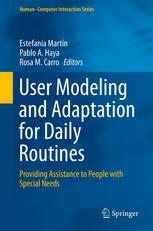

Most ebook files are in PDF format, so you can easily read them using various software such as Foxit Reader or directly on the Google Chrome browser.
Some ebook files are released by publishers in other formats such as .awz, .mobi, .epub, .fb2, etc. You may need to install specific software to read these formats on mobile/PC, such as Calibre.
Please read the tutorial at this link: https://ebookbell.com/faq
We offer FREE conversion to the popular formats you request; however, this may take some time. Therefore, right after payment, please email us, and we will try to provide the service as quickly as possible.
For some exceptional file formats or broken links (if any), please refrain from opening any disputes. Instead, email us first, and we will try to assist within a maximum of 6 hours.
EbookBell Team

5.0
90 reviewsUser Modeling and Adaptation for Daily Routines is motivated by the need to bring attention to how people with special needs can benefit from adaptive methods and techniques in their everyday lives. Assistive technologies, adaptive systems and context-aware applications are three well-established research fields. There is, in fact, a vast amount of literature that covers HCI-related issues in each area separately. However, the contributions in the intersection of these areas have been less visible, despite the fact that such synergies may have a great impact on improving daily living.
Presenting a comprehensive review of state-of-the-art practices on user modeling and adaptation for people with special needs, as well as some reflections on the challenges that need to be addressed in this direction, topics covered within this volume include the analysis, design, implementation and evaluation of adaptive systems to assist users with special needs to take decisions and fulfil daily routine activities. Particular emphasis is paid to major trends in user modeling, ubiquitous adaptive support, diagnostic and accessibility, recommender systems, social interaction, designing and building adaptive assistants for daily routines, field studies and automated evaluation.
Nine leading contributors write on key current research in the domain of adaptive applications for people with special needs, integrating and summarizing findings from the best known international research groups in these areas. User Modeling and Adaptation for Daily Routines highlights how adaptation technologies can ease daily living for all, and support sustainable high-quality healthcare, demographic ageing and social/economic inclusion. highlights how adaptation technologies can ease daily living for all, and support sustainable high-quality healthcare, demographic ageing and social/economic inclusion.